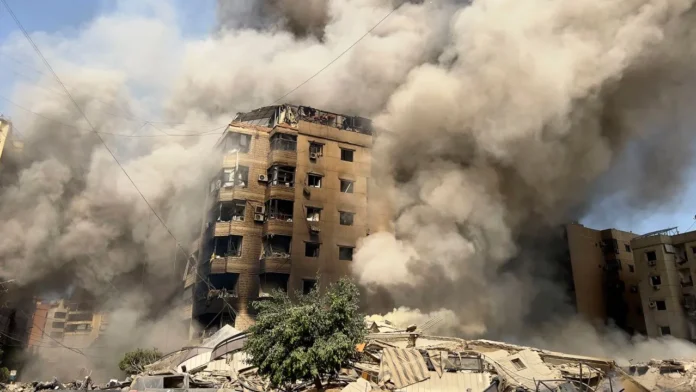In a series of escalating military operations, Israeli forces have launched airstrikes targeting Hezbollah positions in Lebanon and Houthi strongholds in Yemen. The strikes come amidst rising tensions in the Middle East, which have drawn global attention and concern. The airstrikes are being seen as a strategic move by Israel to neutralize perceived threats from militant groups backed by Iran, particularly Hezbollah and the Houthis.
The Lebanon Front: Targeting Hezbollah Leaders
Israel has long viewed Hezbollah, the Lebanese militant organization, as a direct threat to its security. In recent weeks, Israeli airstrikes have intensified in Lebanon, targeting Hezbollah leaders and key infrastructure. On September 29, Israeli forces struck positions believed to be housing senior Hezbollah figures, including the killing of a high-profile leader. This marks the seventh Hezbollah commander killed in the recent campaign, which Israeli officials have described as a proactive measure to dismantle Hezbollah’s military capabilities.
The Israeli government has emphasized that Hezbollah’s ongoing activities along the Lebanon-Israel border, including missile launches and other provocations, necessitated the airstrikes. Israeli Prime Minister Benjamin Netanyahu has made it clear that Israel will not tolerate any aggressive actions by Hezbollah and will take necessary steps to secure its borders.
Regional Repercussions
The situation has also led to heightened tensions across the region, with fears of a broader conflict spreading throughout the Middle East. Hezbollah, which maintains close ties with Iran, has vowed to retaliate for the killing of its leaders and the continued Israeli air raids. The group’s leader, Sayyed Hassan Nasrallah, remains a symbolic and operational figurehead, and Israel’s focus on Hezbollah leadership is seen as an attempt to weaken its command structure.
Yemen: Israel’s First Direct Strikes Against Houthi Targets
In a surprising development, Israel has also conducted airstrikes against Houthi forces in Yemen. This marks the first time Israel has officially targeted the Houthis, a militant group backed by Iran and known for its involvement in the Yemeni Civil War. The Houthis have been increasingly aggressive in recent months, with ballistic missile launches aimed at Saudi Arabia and Israel, raising alarms about the growing reach of their missile capabilities.
According to reports, Israeli airstrikes were launched in response to a Houthi missile attack that targeted southern Israel. The Israeli Defense Forces (IDF) released a statement claiming that the strikes were a direct response to Houthi aggression and were intended to dismantle key Houthi military installations, including missile storage sites and launch platforms.
The Growing Iranian Influence
Both Hezbollah and the Houthis are heavily backed by Iran, which has made significant inroads in the region by providing military and financial support to these groups. Israel views this as part of a broader Iranian strategy to encircle it with hostile forces. By targeting both Hezbollah in Lebanon and the Houthis in Yemen, Israel is attempting to push back against what it sees as a growing Iranian proxy network in the Middle East.
This is not the first time Israel has engaged in indirect confrontation with Iran. For years, Israel has been striking Iranian targets in Syria, but these recent developments expand the scope of Israeli military action to other Iranian-aligned groups in the region.
International Reactions and the Possibility of Escalation
The international community has been closely monitoring the situation, with some countries calling for restraint. The United Nations has expressed concern about the potential for escalation and the humanitarian impact of continued airstrikes, particularly in Yemen, where the civilian population has already been devastated by years of conflict.
Meanwhile, the United States and European allies have largely stood by Israel’s right to defend itself but have also urged caution to avoid sparking a wider regional war. Analysts believe that the situation could spiral into a larger conflict if either Hezbollah or the Houthis carry out retaliatory strikes that force Israel to intensify its military operations.
Conclusion: A Delicate Balance of Power
As Israel continues to strike Hezbollah and Houthi targets, the conflict highlights the complex and volatile nature of Middle Eastern geopolitics. Israel’s actions are driven by security concerns, particularly regarding the growing capabilities of Iranian-backed militant groups. However, the risk of further escalation remains high, and the international community will likely continue to play a role in mediating tensions.
The coming days will reveal whether these airstrikes are effective in quelling the threat or if they lead to further retaliation from Hezbollah and the Houthis, potentially dragging the region into deeper conflict. For now, Israel remains committed to neutralizing any perceived threats to its security, even as it navigates a highly unpredictable and dangerous landscape.



